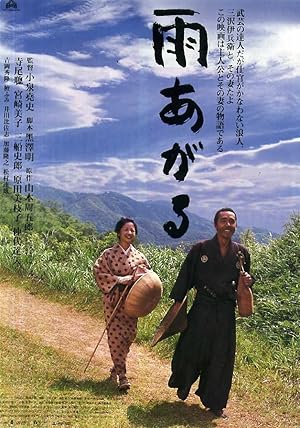
After the Rain Page #5
- Year:
- 1999
- 91 min
- 477 Views
I know it.
'badly received pumpkin'.
pale skinned
of your exalted but.
I'm beginning to get hungry.
What time is it?
I've sent my pages and
the women away.
We'll serve ourselves.
I'll do the introductions.
My chief-vazal, Ishiyama Kihei.
'mule-face'.
The second vazal, Akashi Butayu.
'The scarecrow'.
I am Misawa Ihei...
at your service.
Those two here are
the antiquities of the fief.
the old-fashioned geezers.
I don't know if the have real value
but I know they're really old.
Okay, everybody take their rolls
and take it easy.
The dishes are beautiful
but the contents aren't worth it.
Especially for me
whose health is under constant watch...
They forbid me to eat any greasy fish
and while the fish is being eaten,
I always eat my cold soup.
It's really horrible!
The other day, I wanted to give
some fish to the cat of my concubine.
She smelled it,
looked totally disgusted
and preferred to leave the room!
Oh yes... I have chosen
our master-of-arms.
Here he is.
I've had a wonderful day.
The proposals were interesting
and I have refound pleasure.
Sir, this post is very
important.
We must proceed with the
greatest precaution.
You doubt my judgment?
Gon!
That man has enchanted me.
What do you think of him?
Your judgment is sound.
I've also had the honor of seeing
the wife of sir Misawa
and the excellence of theirs characters
has fulfilled me with admiration.
but, in choosing a master of arms,
everyone must agree
and tradition wants there to be
demonstration...
Again 'tradition'!
I don't think it's necessary!
If we fixed a date so he could
demonstrate his talent,
would that be appropriate for you?
At your service.
mule-heads!
I will remain angry!
Facing us three,
dojo masters,
he has won each duel!
It's intolerable!
Sir, that was all a trick.
humble and so delicate...
He has fooled our vigilance!
That such an individual has
been invited to the castle...
it's incomprehensible!
He's a devious man.
He knows how to sell himself...
with extreme politeness.
Either way,
the master of arms of this fief
must be one of our own.
If not, how will we uphold our
pride in this stronghold?
No worries!
His Holiness is very attentive
to details...
We won't let a buzzard steal our
cheese!
Listen to this!
He left in a carrying-chair
with a following covered by gifts.
I thank you.
If I find any food,
I'll bring it to you.
Hello again.
Rejoice yourself.
I've been appointed to become the master
of arms of this fief.
At least, I think it's decided.
In fact, It will be official when
I give a demonstration,
but the lord said that's superfluous.
Translation
Translate and read this script in other languages:
Select another language:
- - Select -
- 简体中文 (Chinese - Simplified)
- 繁體中文 (Chinese - Traditional)
- Español (Spanish)
- Esperanto (Esperanto)
- 日本語 (Japanese)
- Português (Portuguese)
- Deutsch (German)
- العربية (Arabic)
- Français (French)
- Русский (Russian)
- ಕನ್ನಡ (Kannada)
- 한국어 (Korean)
- עברית (Hebrew)
- Gaeilge (Irish)
- Українська (Ukrainian)
- اردو (Urdu)
- Magyar (Hungarian)
- मानक हिन्दी (Hindi)
- Indonesia (Indonesian)
- Italiano (Italian)
- தமிழ் (Tamil)
- Türkçe (Turkish)
- తెలుగు (Telugu)
- ภาษาไทย (Thai)
- Tiếng Việt (Vietnamese)
- Čeština (Czech)
- Polski (Polish)
- Bahasa Indonesia (Indonesian)
- Românește (Romanian)
- Nederlands (Dutch)
- Ελληνικά (Greek)
- Latinum (Latin)
- Svenska (Swedish)
- Dansk (Danish)
- Suomi (Finnish)
- فارسی (Persian)
- ייִדיש (Yiddish)
- հայերեն (Armenian)
- Norsk (Norwegian)
- English (English)
Citation
Use the citation below to add this screenplay to your bibliography:
Style:MLAChicagoAPA
"After the Rain" Scripts.com. STANDS4 LLC, 2024. Web. 3 Jun 2024. <https://www.scripts.com/script/after_the_rain_2652>.


Discuss this script with the community:
Report Comment
We're doing our best to make sure our content is useful, accurate and safe.
If by any chance you spot an inappropriate comment while navigating through our website please use this form to let us know, and we'll take care of it shortly.
Attachment
You need to be logged in to favorite.
Log In